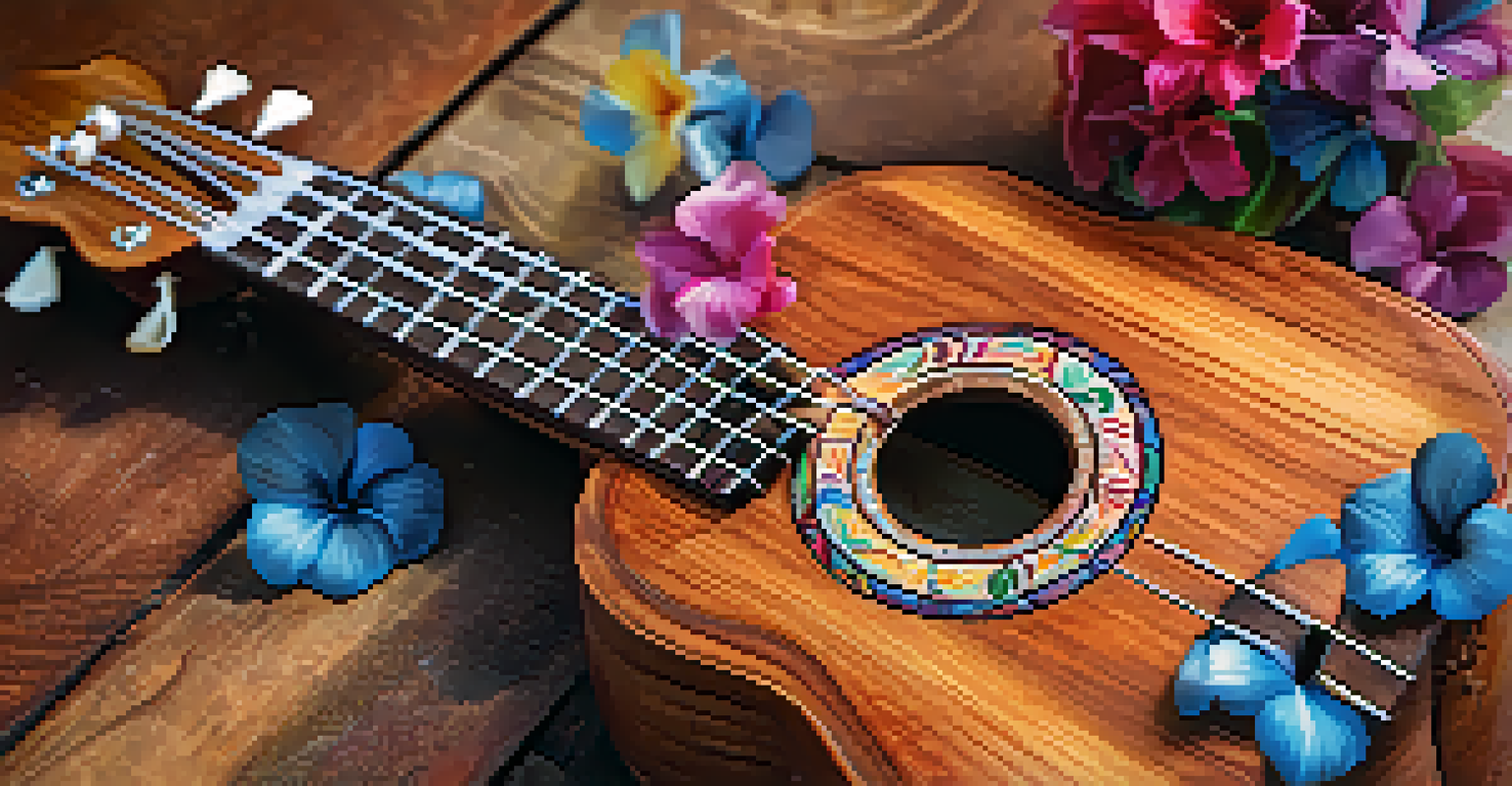The Ukulele's Role in Shaping Modern Pop Music Trends

A Brief History of the Ukulele in Music
The ukulele, often associated with Hawaiian music, has roots that trace back to the 19th century. Originally brought to Hawaii by Portuguese immigrants, it quickly became a staple in local culture. Its cheerful sound and portability made it popular among musicians and songwriters alike. Over the decades, the ukulele has evolved, transitioning from a niche instrument to a key player in various music genres.
The ukulele is a joyful instrument; it’s like a friendly voice that invites everyone to join in.
Throughout the 20th century, the ukulele found its way into American pop culture, thanks to artists like Bing Crosby and the famous 'Tiny Tim.' Its light-hearted tone resonated with audiences, helping to shape the sound of the era. By integrating the ukulele into mainstream music, these artists helped elevate its status beyond Hawaiian music, paving the way for future generations.
Today, the ukulele's influence continues to grow, appealing to a diverse range of artists. Its unique sound has been embraced by various genres, including rock, indie, and even pop. This versatility has positioned the ukulele as a bridge between traditional and contemporary music.
The Ukulele's Comeback in Recent Years
In recent years, the ukulele has experienced a significant resurgence, particularly among younger musicians. The rise of social media platforms like YouTube and TikTok has played a crucial role in this revival. Many aspiring artists showcase their ukulele skills, creating viral trends and fostering a community of enthusiasts. This accessibility has made it easier for anyone to pick up the instrument and join the fun.

Notable pop artists such as Ed Sheeran and Jason Mraz have incorporated the ukulele into their music, bringing it into the mainstream. Their catchy songs often feature the instrument, captivating audiences with its cheerful sound. This exposure has not only increased the ukulele's popularity but also inspired countless people to learn how to play.
Ukulele's Rich Musical History
The ukulele, with its Portuguese roots and Hawaiian flair, has evolved from a niche instrument to a beloved staple across various music genres.
The ukulele's role in modern pop music can also be seen in collaborations between established artists and emerging talents. These partnerships often blend various genres, showcasing the instrument's versatility. As a result, the ukulele has become a symbol of creativity and collaboration in the music industry.
The Ukulele's Impact on Songwriting
The ukulele's distinct sound has influenced songwriting methods across genres. Its bright, cheerful tones can evoke emotions that resonate with listeners, making it an attractive choice for songwriters. Many artists find that the instrument inspires new melodies and chord progressions, leading to fresh, innovative songs.
Music is the universal language of mankind, and the ukulele is a beautiful way to express it.
Moreover, the simplicity of the ukulele encourages experimentation, allowing artists to step outside their comfort zones. With just four strings, it's often seen as a more approachable instrument for beginners. This accessibility has encouraged countless songwriters to explore their creativity, resulting in a wealth of unique compositions.
The ukulele has also become a popular tool for storytelling in music. With its playful sound, it can elevate a song's narrative, drawing listeners into the artist's world. This has led to a growing trend of storytelling through music, using the ukulele as a primary instrument to convey messages and emotions.
Embracing Diversity in Music Genres with the Ukulele
One of the most exciting aspects of the ukulele is its ability to blend seamlessly into various music genres. From pop to rock, jazz to folk, musicians have found creative ways to incorporate this instrument into their sound. This diversity allows for a rich tapestry of musical styles that appeal to a wide audience.
For instance, artists like Twenty One Pilots have effectively used the ukulele in their alternative rock songs, adding a unique twist to their sound. By breaking genre boundaries, they have introduced the instrument to fans who may not have otherwise encountered it. This has sparked interest in the ukulele, encouraging listeners to explore its versatility.
Resurgence Among Young Musicians
Social media platforms have sparked a significant revival of the ukulele, inspiring a new generation of musicians and songwriters.
As more genres embrace the ukulele, we see a fusion of sounds that reflects the modern music landscape. Collaborations between artists from different backgrounds have led to exciting innovations, showcasing the instrument's adaptability. The ukulele is not just a niche instrument; it has become a vital part of the evolving music scene.
The Ukulele in Live Performances
The ukulele's light weight and portability make it an excellent choice for live performances. Musicians can easily carry it to gigs, making it accessible for both small venues and big stages. This convenience has contributed to its popularity among touring artists, who appreciate the instrument's practicality.
Additionally, the ukulele's engaging sound often captivates audiences, creating a lively atmosphere at shows. Its cheerful tone can lift spirits and encourage audience participation, making for memorable performances. Many artists have reported that incorporating the ukulele into their sets has helped enhance their connection with fans.
Live performances featuring the ukulele often showcase the instrument's versatility, with musicians experimenting with different styles and techniques. This allows for a dynamic range of sounds that keeps audiences entertained. As the ukulele continues to gain popularity, we can expect to see even more creative uses in live music settings.
The Ukulele's Influence on Music Education
The ukulele has become a popular instrument for music education, particularly in schools and community programs. Its simplicity makes it an ideal choice for beginners, allowing students to grasp the basics of music theory quickly. As a result, many music educators have adopted the ukulele as a primary teaching tool.
Incorporating the ukulele into music curricula has proven to be effective in fostering a love for music among students. Its approachable nature encourages participation, making it a fun and engaging instrument to learn. This has led to an increase in interest in music education, as more students discover the joys of playing.
Impact on Music Education
The ukulele's simplicity and accessibility make it an ideal instrument for music education, fostering engagement and collaboration among students.
Moreover, ukulele programs often promote collaboration and teamwork, as students learn to play together. This creates a sense of community and shared experience, enhancing the overall learning environment. By embracing the ukulele in music education, we are nurturing the next generation of musicians.
The Future of the Ukulele in Pop Music
As we look to the future, the ukulele's role in pop music seems brighter than ever. Its adaptability and charm have captured the hearts of both musicians and audiences alike. With more artists incorporating the instrument into their work, we can expect to see innovative and exciting developments in the music industry.
Additionally, the growing accessibility of the ukulele through online tutorials and resources is likely to inspire even more musicians to explore its potential. This influx of new talent may lead to fresh styles and genres, further enriching the music landscape. The instrument's popularity shows no signs of waning anytime soon.

Ultimately, the ukulele is not just a passing trend; it represents a shift towards inclusivity and creativity in music. As artists continue to experiment and break boundaries, the ukulele will undoubtedly remain a beloved instrument in shaping the future of pop music.